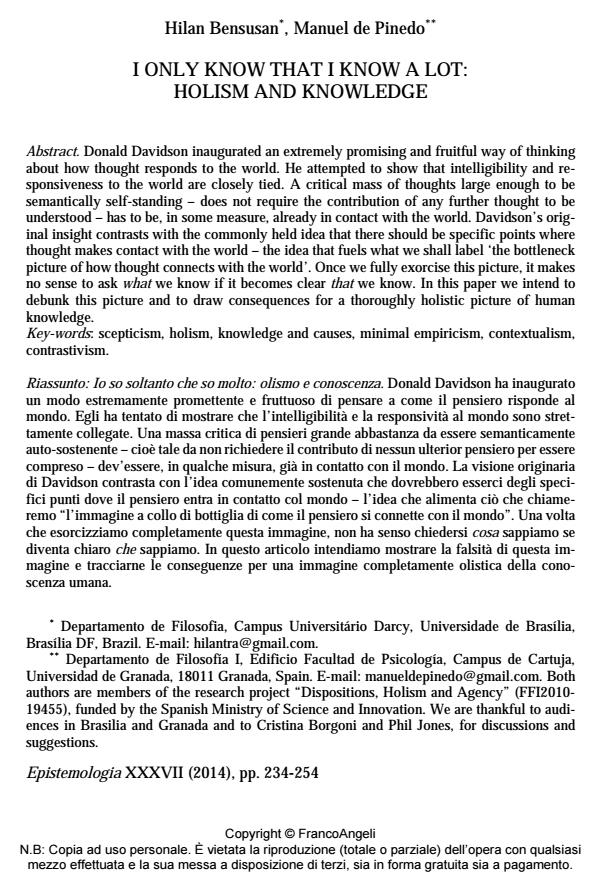I only know that i know a lot: holism and knowledge
Journal title EPISTEMOLOGIA
Author/s Hilan Bensusan, Manuel de Pinedo
Publishing Year 2015 Issue 2014/2 Language English
Pages 21 P. 234-254 File size 82 KB
DOI 10.3280/EPIS2014-002004
DOI is like a bar code for intellectual property: to have more infomation
click here
Below, you can see the article first page
If you want to buy this article in PDF format, you can do it, following the instructions to buy download credits

FrancoAngeli is member of Publishers International Linking Association, Inc (PILA), a not-for-profit association which run the CrossRef service enabling links to and from online scholarly content.
Donald Davidson inaugurated an extremely promising and fruitful way of thinking about how thought responds to the world. He attempted to show that intelligibility and responsiveness to the world are closely tied. A critical mass of thoughts large enough to be semantically self-standing - does not require the contribution of any further thought to be understood - has to be, in some measure, already in contact with the world. Davidson’s original insight contrasts with the commonly held idea that there should be specific points where thought makes contact with the world - the idea that fuels what we shall label ‘the bottleneck picture of how thought connects with the world’. Once we fully exorcise this picture, it makes no sense to ask what we know if it becomes clear that we know. In this paper we intend to debunk this picture and to draw consequences for a thoroughly holistic picture of human knowledge.
Keywords: Scepticism, holism, knowledge and causes, minimal empiricism, contextualism, contrastivism
- Bensusan H., Pinedo M. de (2007). Minimal Empiricism without Dogmas, Philosophia: Philosophical Quarterly of Israel, 35, pp. 197-206.
- Bensusan H., Pinedo M. de (2014). Soft Facts. Thinking Practices and the Architecture of Reality, Daimon, 61, pp. 7-21.
- Beillard J. (2010). Triangles, Schemes and Worlds: Reply to Nulty, Metaphysica, 11, pp. 181-190.
- Brandom R. (1994). Making it Explicit, Cambridge (Mass.), Harvard University Press.
- Cohen S. (1986). Knowledge and Context, The Journal of Philosophy, 83, pp. 574-583.
- Davidson D. (1974). On the Very Idea of a Conceptual Scheme. In Davidson D. (1984), Inquiries into Truth and Interpretation, Oxford, Clarendon Press, pp. 183-198.
- Davidson D. (1982). Empirical Content. In Davidson D. (2001), pp. 159-176.
- Davidson D. (1983). A Coherence Theory of Truth and Knowledge. In Davidson D. (2001), Subjective, Intersubjective, Objective, Oxford, Oxford University Press, pp. 137-153.
- Davidson D. (1986). A Nice Derangement of Epitaphs. In Davidson D. (2005), Truth, Language, and History, Oxford, Oxford University Press, pp. 89-107.
- Davidson D. (1987). Knowing One’s Own Mind. In Davidson D. (2001), Subjective, Intersubjective, Objective, Oxford, Oxford University Press, pp. 15-38.
- Davidson D. (1988). The Myth of the Subjective. In Davidson D. (2001), Subjective, Intersubjective, Objective, Oxford, Oxford University Press, pp. 39-52.
- Davidson D. (1990). Epistemology Externalized. In Davidson D. (2001), Subjective, Intersubjective, Objective, Oxford, Oxford University Press, pp. 193-204.
- Davidson D. (1991). Three Varieties of Knowledge. In Davidson D. (2001), Subjective, Intersubjective, Objective, Oxford, Oxford University Press, pp. 205-220.
- Davidson D. (2001). Subjective, Intersubjective, Objective, Oxford, Oxford University Press.
- DeRose K. (1992). Contextualism and Knowledge Attributions, Philosophy and Phenomenological Research, 52, pp. 913-929.
- Ewing A.C. (1934). Idealism: A Critical Survey, London, Methuen.
- Hornsby J. (1997). Truth: The Identity Theory, Proceedings of the Aristotelian Society, 97, pp. 1-24.
- Kant I. (1781). Kritik der reinen Vernunft, Riga, Hartknoch (English trans. Critique of Pure Reason, London, Macmillan, 1929).
- Klein P. (2000). Contextualism and the Real Nature of Academic Skepticism, Philosophical Issues, 10, pp. 108-116.
- Lewis D. (1996). Elusive Knowledge, Australasian Journal of Philosophy, 74, pp. 549-567.
- Malpas J. (2008). On Not Giving Up the World: Davidson and the Grounds of Belief, International Journal of Philosophical Studies, 16, pp. 201-215.
- McDowell J. (1994). Mind and World, Cambridge (Mass.), Harvard University Press.
- McDowell J. (1995). Knowledge and the Internal, Philosophy and Phenomenological Research, 55, pp. 877-893.
- Nulty Th. (2009). Conceptual Schemes Revisited: Davidsonian Metaphysical Pluralism, Metaphysica, 10, pp. 123-134.
- Peirce C.S. (1868). Questions Concerning Certain Faculties Claimed for Man, Journal of Speculative Philosophy, 2, pp. 103-114.
- Pinedo M. de (2006). Anomalous Monism: Oscillating between Dogmas, Synthese, 148(1), pp. 79-97.
- Pinedo M. de, Bensusan H. (2006). Brandom on Thought and Reality. Showing the Inferentialist the Way Out of the Bottleneck, Teorema, 26, pp. 21-36.
- Pinedo M. de, Bensusan H. (2012). Sense and Sensibility Educated. A Note on Experience and (Minimal) Empiricism, International Journal of Philosophical Studies, 20, pp. 741-747.
- Putnam H. (1975). The Meaning of ‘Meaning’. In Mind, Language and Reality. Philosophical Paper, vol.2, Cambridge, Cambridge University Press, pp. 215-271.
- Quine W.V.O. (1951). Two Dogmas of Empiricism. In From a Logical Point of View, Cambridge (Mass.), Harvard University Press, pp. 20-46.
- Quine W.V.O. (1991). Two Dogmas in Retrospect, Canadian Journal of Philosophy, 21, pp. 265-274.
- Rorty R. (1986). Pragmatism, Davidson, and Truth. In Lepore E. (ed.), Truth and Interpretation, Oxford, Blackwell, pp 333-355.
- Schaffer J. (2005). Contrastive Knowledge. In Gendler S., Hawthorne J. (eds.), Oxford Studies in Epistemology 1, Oxford, Oxford University Press, pp. 235-271.
- Schaffer J., Knobe J. (2012). Contrastive Knowledge Surveyed, Noûs, 46(4), pp. 675-708.
- Sosa E. (2000). Skepticism and Contextualism, Philosophical Issues, 10, pp. 1-18.
- Wettstein H. (2004). The Magic Prism – An Essay in the Philosophy of Language, Oxford, Oxford University Press.
- Williamson T. (2000). Knowledge and its Limits, Oxford, Oxford University Press.
- Wittgenstein L. (1921). Tractatus Logico-Philosophicus, London, Routledge
Hilan Bensusan, Manuel de Pinedo, I only know that i know a lot: holism and knowledge in "EPISTEMOLOGIA" 2/2014, pp 234-254, DOI: 10.3280/EPIS2014-002004